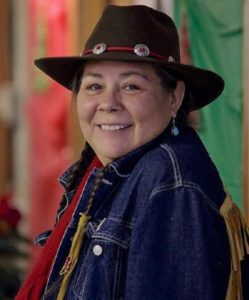Anishinaabe kwe making big moves in natural housing

By Brian Wright-McLeod
CHIPPEWAS OF GEORGINA ISLAND FIRST NATION— Affordable housing is seemingly an unattainable dream for many. But a land-based movement is growing on Georgina Island. The imagination and determination of community member Becky Big Canoe is making the dream come true. A little at a time.
“The issues are more than new housing,” Big Canoe said. “What we can do across the country represents real innovation for the people.”
She started by researching and constructing her own straw bale home. Then came the initiatives of food security and rainwater collection and storage. Currently, she is passing her experience and achievements onto other indigenous women and their communities.
Big Canoe has been a long-time fan of Michael Reynolds’ Earthship concept that uses recycled materials, passive solar architecture, innovative design that employ ecological concepts, among other attributes that generate their own energy and produce their own food.
“I’ve been a proponent of natural housing even before I took a course in sustainable building and design at Fleming College in Peterborough in 2011,” she said. “We built this current home out of natural, local materials including clay or lime and plaster. Everything we used was sourced from the land.”
The project involves different components including food security and food storage, while utilizing water capture, biotechnology and working with the earth to mitigate waste in a safe way.
“The straw bale home I built was fire tested. Its great quality and healthier to live in. After 20 years, there have been no negative issues. But, to do this, a land base is important, and I’m lucky to have land that I inherited from my dad.”
Traditional ways and adherence to cultural values are cornerstones to keep the focus on the land and the people in a vital way.
“Our ceremonies and traditional ways are incorporated into the cycles of the land. And I’ve been at this for a long time,” she said. “It’s good to be at the beginning of this. Cultural memory sparks action in the face of challenging times.”
Big Canoe understands that cooperative work and building a level of self-sufficiency through personal innovation and development provides a path to alleviate the critical lack of housing.
“I find the work of Winona LaDuke to be inspirational,” she said. “She sees that utilizing anything positive that develops life ways is a solution in itself. We need to get back to using heirloom seeds, meat and fish preservation and permaculture.”
The federal government recently issued a call out to urban and rural communities for proposals in these areas.
“We’re creating a proposal to create training of our own,” she said. “We’ve prepared and getting ready to submit an enviro-Native training initiative focused on women who are willing to build their own sustainable housing and to develop independent food security. You can’t have a happy existence when you’re living in despair.”
Educating others is also an important step to help build a movement of sustainable living.
“We’re also doing a documentary that illustrates the need for this type of innovation in home-building and sustainable living,” she said. “It can be used as in funding proposals and as a training tool to help get people started on these type of projects.”
“If I can do it, anyone can.”

